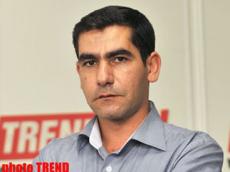|
|
TODAY.AZ / World news
Reelected Obama and old Iran: Hope for talks
07 November 2012 [21:03] - TODAY.AZ
 Barack Obama was reelected as the U.S. president, and will deal with Iranian question, which has turned into a priority for U.S. foreign policy over the next four years.
Barack Obama was reelected as the U.S. president, and will deal with Iranian question, which has turned into a priority for U.S. foreign policy over the next four years.Obama is the only U.S. president who has addressed letters to Supreme Leader Ayatollah Ali Khamenei.
On the other hand, in his first term, and especially during the last year the U.S. imposed hard sanctions to Iran. The Obama administration has also made that the EU countries imposed similar sanctions against Iran.
U.S. sanctions entered into force on June 28, while EU bans on Iranian oil imports came into force on July 1, resulting in the daily oil sales decrease. It decreased from 2.3 million barrels to 1 million barrels during the first nine months. It is worth to recall that oil accounts for 80 percent of Iranian export. International Energy Agency noted that oil exports in September fell even to 860,000 barrels per day.
Oil production, the export of which brings half of the proceeds to the country, also decreased. It decreased from 3.7 million to 2.64 million barrels per day. It means a daily loss of $150 million for Iran compared to last year. Iran should begin negotiations with the U.S., which led anti-Iran sanctions, to break the deadlock.
Hope for talks
The Iranian presidential elections will be held in 2013, but Obama's letters addressed directly to the Iranian spiritual leader Ayatollah Khamenei in June 2009 and in January 2012, stated that the U.S. believes that the country's foreign policy and the outcome of negotiations on the Iranian nuclear program depends on the supreme leader. Thus, Obama can continue direct contacts with Iran, without waiting for the presidential elections in the country.
Last month, the New York Times disseminated information about the visit of the chief adviser to Iran's supreme leader Ali Akbar Velayati to Washington for talks with the U.S.. This information was denied by the officials of both sides. However, Iranian President Mahmoud Ahmadinejad has repeatedly stressed the importance of the negotiations with the U.S. and the normalization of relations to resolve the political crisis between the two countries, in his many interviews during his visit to New York for the UN General Assembly.
The absence of a strong reaction of the Supreme Leader to the statement of the President shows that the Iranian government is really prepared to contacts with the U.S..
Iran has so far produced 190 kg of uranium enriched to 20 percent, and 38 percent of the uranium is turned into fuel. In addition, Iran has installed 860 new centrifuges at the uranium enrichment plant at Fordow, but does not activate them. It is likely that by doing so it sent a positive message to the West.
There is only one reactor operating at 20-percent uranium fuel In Iran, which is produced in the country in sufficient quantities.
Previously, Teheran said it is ready to stop the process of enriching uranium to 20 percent in the case of cancellation of Western sanctions.
Of course, the relationship between the U.S. and Iran is a tangle of many complex problems that have accumulated over 33 years.
Dalga Khatinoglu /Trend/
URL: http://www.today.az/news/regions/114848.html
 Print version
Print version
Views: 3813
Connect with us. Get latest news and updates.
See Also
- 24 January 2026 [23:27]
China’s top general under investigation in latest military purge - 24 January 2026 [22:59]
Chinese automaker takes over Nissan’s South African plant, safeguarding jobs - 24 January 2026 [21:58]
Venezuela advances major oil law overhaul to open sector to private and foreign firms - 24 January 2026 [20:20]
Pentagon’s new strategy: Russia a “manageable threat,” China a growing challenge - 24 January 2026 [19:56]
Trump names 'secret weapon' used in Venezuela - 24 January 2026 [19:56]
Trump names 'secret weapon' used in Venezuela - 24 January 2026 [19:24]
Zelensky: Talks in Abu Dhabi were constructive - 24 January 2026 [18:55]
Syria seeks Türkiye’s support to develop oil fields reclaimed from SDF - 24 January 2026 [18:27]
Trump: 100% tariff for Canada in case of China deal - 24 January 2026 [17:27]
Ukraine talks to resume in Abu Dhabi next week
Most Popular
 Strategic dialogue between Baku and Washington - how it goes in economy
Strategic dialogue between Baku and Washington - how it goes in economy
 President Ilham Aliyev, U.S. President hold expanded meeting in Davos
President Ilham Aliyev, U.S. President hold expanded meeting in Davos
 Azerbaijan and BlackRock: Baku has chosen right partners
Azerbaijan and BlackRock: Baku has chosen right partners
 How Azerbaijan turns energy wealth into long-term growth
How Azerbaijan turns energy wealth into long-term growth
 SOCAR acquires 10% stake in Eni’s Baleine oil and gas project offshore Côte d’Ivoire
SOCAR acquires 10% stake in Eni’s Baleine oil and gas project offshore Côte d’Ivoire
 NATO Chief warns Europe not to lose focus on Ukraine amid Russian attacks
NATO Chief warns Europe not to lose focus on Ukraine amid Russian attacks
 President Ilham Aliyev attending signing ceremony for ‘Board of Peace’ on Gaza at Davos
President Ilham Aliyev attending signing ceremony for ‘Board of Peace’ on Gaza at Davos
